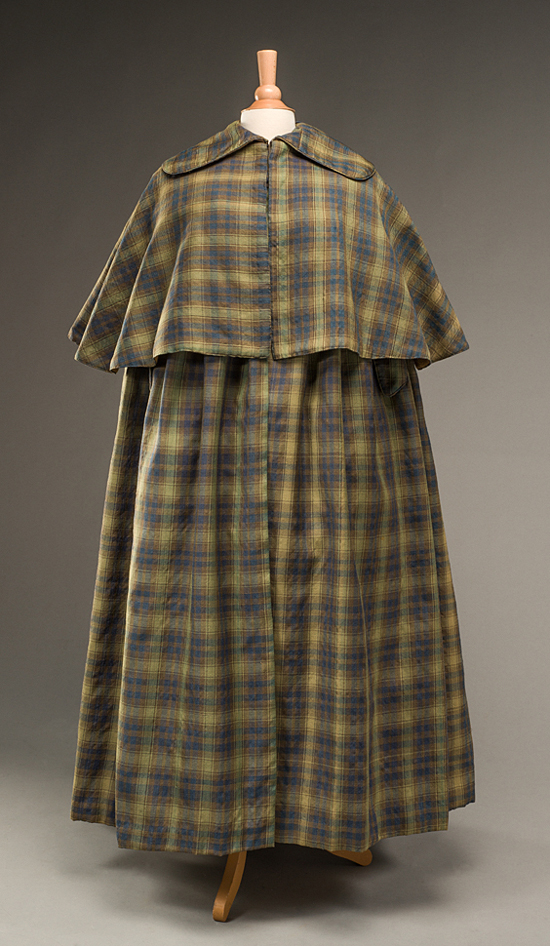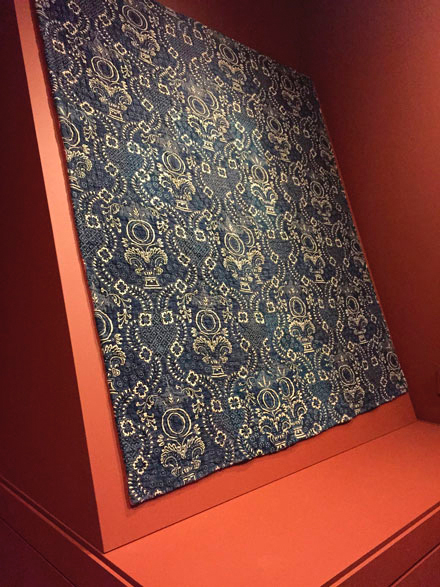
American woman’s cape or cloak, 1825–1840, made from a twill weave wool plaid in blue, brown and two shades of green. This garment, which would have been made by an experienced dressmaker or tailor, is an important example of a good and serviceable women’s outerwear that would have been worn in early Nineteenth Century Connecticut River Valley.
DEERFIELD, MASS. — Just over 20 years ago, on June 4, 1965, the brand-new Fabric Hall was opened to the public at Historic Deerfield (then known as The Heritage Foundation). Situated behind the Silver Museum in a renovated 1870s barn (now Historic Deerfield’s History Workshop), Fabric Hall showcased the museum’s growing collection of clothing, needlework and domestic textiles.
The gallery, which included innovative ambient lighting, air conditioning and radiant floor heat, conveyed an early awareness of the need to monitor environmental conditions to protect fragile items. Fabric Hall was the dream of Helen Geier Flynt (1895–1986) who, along with her husband, Henry N. Flynt (1893–1970), founded Historic Deerfield. No longer limited to the small spaces of the historic house museums, Fabric Hall allowed Helen free reign to display a range of items in the collection, from more exotic and opulent textiles to historic fashions and textiles demonstrating aesthetic or technical excellence.
Clothing from the collection was initially displayed on mannequins from Wilson’s department store in Greenfield, Mass. Mrs Flynt enlisted the help of Mary Brosnan, a leading mannequin manufacturer in Long Island City, Queens, N.Y., to create mannequins that conformed to the correct Eighteenth Century posture for men and women who at the time would have been aided by the use of stays and corsets.
In 1998, the extensive textile collection, which today numbers some 8,000 objects, was officially moved to the Flynt Center of Early New England Life, allowing the museum to permanently display items from the collection in the exhibition “Celebrating the Fiber Arts: The Helen Geier Flynt Textile Gallery,” which opened in 2007. The exhibition features a vast array of costumes, needlework and domestic textiles from the Eighteenth and Nineteenth Centuries that are displayed on a rotating basis.
“In addition to our historic house museums, today’s Helen Geier Flynt Textile Gallery is an important showcase for our fashion and textile collection,” said David E. “Ned” Lazaro, associate curator of textiles for Historic Deerfield. “The current installation engages visitors to think about woven, embroidered and sartorial masterpieces created from four natural fibers: silk, wool, cotton and linen.”

The first item of the Helen Geier Flynt Textile Collection was a circa 1800 wholecloth, blue and white, resist-printed cotton and flax blend quilt with an elaborate, asymmetrical, repeating pattern of stylized flower pots, floral sprays, blue leaves and patterned circles on a white ground arranged in vertical strips and cotton patches. The quilt is indicative of similar examples made in the Rouen area of France, northwest of Paris.
On display now in the gallery is the very first item of the Helen Geier Flynt Textile Collection, a circa 1800 wholecloth, blue and white, resist-printed cotton and flax blend quilt with a repeating pattern of stylized vases and flowers.
Also on view is a wool cloak made and worn in New England during the early Nineteenth Century. The garment was made from a tartan check probably from the William Wilson and Son firm in Bannockburn, Scotland, between Glasgow and Edinburgh. Made before the advent of today’s synthetic, high-tech performance fleece, the high quality wool nevertheless provided warmth and some water resistance.
The ongoing anniversary celebration, “Fashioning a Legacy: The 50th Anniversary of the Helen Geier Flynt Textile Collection,” features a variety of events to showcase the collection, including a lecture series and forum.
Historic Deerfield is off Old Main Street. For additional information, 413-775-7132 or www.historic-deerfield.org.
Read article and see more images inside July 17, 2015 E-edition

